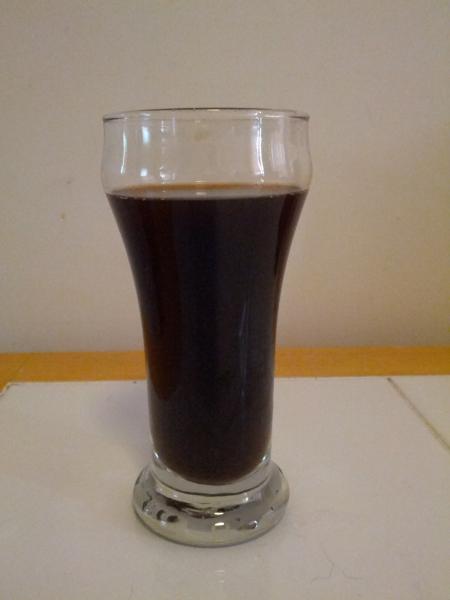Brewed a Schwartzbier last night, and with a couple of small exceptions, things went pretty smoothly.
I usually brew 3 gallon batches, but because this was a lager that was going to sit for three months, I wanted to do a full 5.5 gallon batch. In the process, I must have incorrectly measured my runoff, because when I went to dump the finished wort into my fermenter, I was shocked to discover I had about one gallon more than would fit in my fermenter (a five gallon fermenter with a lot of head space).
Curious. Anyhow, I didn't want to let it go to waste, so I threw it in a three gallon jug, kept the lid loose, and added some champagne yeast (the only extra yeast I had lying around the house).
Any idea what I'm going to get with this? I know some people have played around with adding champagne or wine yeasts in addition to beer yeasts (best example I've ever had: Enlightenment's Bier de Champagne). But what about adding only champagne yeast?
I suppose I'll find out in a couple weeks!
The Recipe:
3.5 lbs Briess Munich
3 lbs German 2row Pils
1 lb Weyermann Carafa II
1 lb German Dark Munich
1 lb Weyermann CaraFoam
1/4 lb Rice Hulls
Mash at 150°, 45 min.
160°, 30 min.
90 minute boil
.75 oz Hallertau (60 min)
.5 oz Hallerau (30 min)
1 oz Hallertau (1 min)
Red Star Montrachet
(Used Saflager 34/70 for the actual Schwartzbier)
I usually brew 3 gallon batches, but because this was a lager that was going to sit for three months, I wanted to do a full 5.5 gallon batch. In the process, I must have incorrectly measured my runoff, because when I went to dump the finished wort into my fermenter, I was shocked to discover I had about one gallon more than would fit in my fermenter (a five gallon fermenter with a lot of head space).
Curious. Anyhow, I didn't want to let it go to waste, so I threw it in a three gallon jug, kept the lid loose, and added some champagne yeast (the only extra yeast I had lying around the house).
Any idea what I'm going to get with this? I know some people have played around with adding champagne or wine yeasts in addition to beer yeasts (best example I've ever had: Enlightenment's Bier de Champagne). But what about adding only champagne yeast?
I suppose I'll find out in a couple weeks!
The Recipe:
3.5 lbs Briess Munich
3 lbs German 2row Pils
1 lb Weyermann Carafa II
1 lb German Dark Munich
1 lb Weyermann CaraFoam
1/4 lb Rice Hulls
Mash at 150°, 45 min.
160°, 30 min.
90 minute boil
.75 oz Hallertau (60 min)
.5 oz Hallerau (30 min)
1 oz Hallertau (1 min)
Red Star Montrachet
(Used Saflager 34/70 for the actual Schwartzbier)



